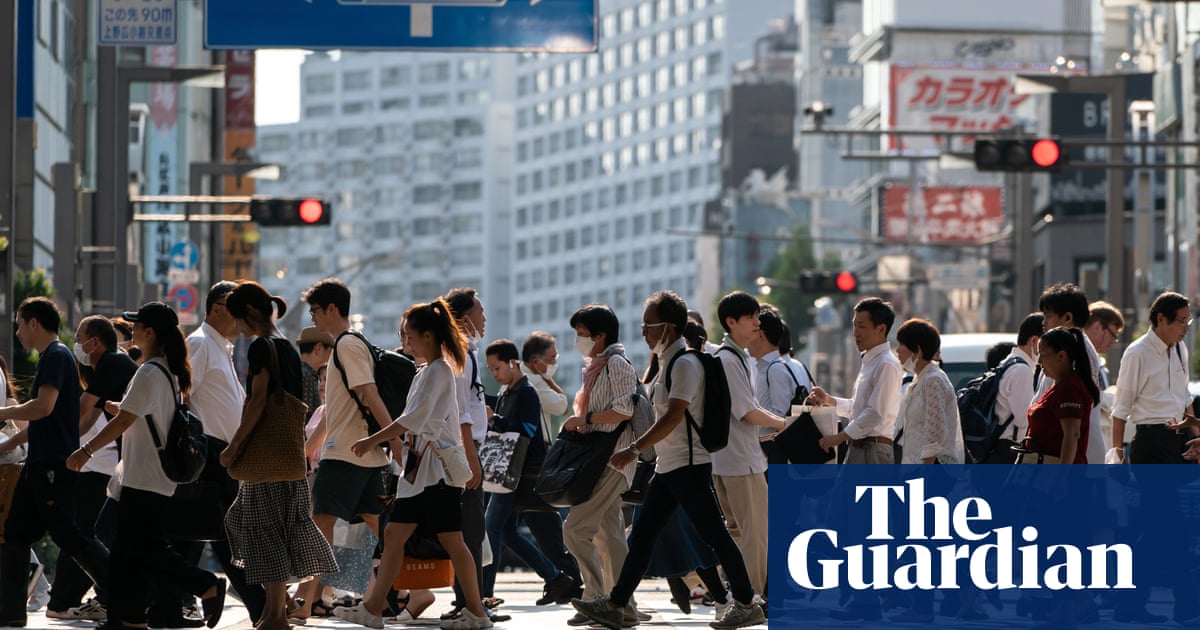Low birthrate and ageing population pose ‘an urgent risk to society’, but can opening its borders to skilled overseas workers fix the problem?
First, there is no “wrestling”. The policy is clear. Second, the only way to fix declining population is to increase permanent residence, which means either a Permanent Residence Visa or citizenship. But it takes 10 years for Permanent Residence, and Japan bans dual citizenship. Work visas do not fix the problem. But work visas are popular because immigrants can be treated as slave labor.
In other words, the author of that article has done a small amount of research but is actually being far to generous to a xenophobic and racist government that’s enabling the abuse of foreign laborers.
I think they are also missing the fact that there are sections of Japan’s society that would rather see it shrink (collapse) and retain its Nihon-ness than be diluted by outside influences.
And that’s their right, and not unexpected either.
I think by “wrestling” they mean the general attitude towards foreigners, not the policy.
But it takes 10 years for Permanent Residence, and Japan bans dual citizenship.
not for children of mixed parents
Japan is a super old civilization and they’ve been through plenty of challenging times. They may stick out the next 40 years and continue to do what they have been for the next thousand years.
You do you Japan!
Japan is not alone in this.
The three countries that are getting hit with declining population are also the ones with some of the lowest migration rates in the world.
Japan.
Sth Korea.
China.
Decades of government backed protectionism paired with an ageing population will do that. people were widely propagandised into xenophobia and that sort of thing tends to stick in the psyche of the community for generations.
That said, the older generations are the ones still holding onto those views and they will be forced to change eventually.
You can still find signs on restaurants or shops across Asia that say “no tourists” or things like that, but they are becoming less common, even in rural areas. there is still the language barrier with the older generations, which is part of the reason those signs existed, but the majority of younger people across most of east Asia have some level of English from their mandatory school curriculums. They learn more western history, more western customs, exposed to more western media, western style homes are popular to those who can afford them (the Japanese housing market is it’s own deep, deeeep topic), etc. etc. so those people naturally become more open and accepting of immigration
I expect to see japan keep crashing for another 10 years or so though sadly, and while Korea has been fairly stable they are rolling towards the same sort of downturn themselves.
China has been slowing economically for some years now for the same reasons, but their situation is a little different as their government will do whatever is necessary to protect their image, above their actual economy, so it is hard to know what is really happening there. For example, the whole giving gold to home buyers to avoid crashing the housing market thing.
(the Japanese housing market is it’s own deep, deeeep topic)
and I’d love to hear about it
Its a complex and multi-layered issue, but the short gist of it is that many houses have become effectively worthless, there are thousands of abandoned properties as they are often impossible to sell, whether they are liveable or not, and there is no incentive to hold onto property and maintain it as the value always depreciates.
In most countries, a home will appreciate in value slowly over time, with some fluctuation, but in general it is a good idea if you can afford it, there is incentive to maintain and upgrade the property as it can be sold later in life or passed down to family. The Japanese market has some of that in valuable areas of course, well built up to code homes, with nearby access to public transport and services, same with older historic homes that are worth the cost of upkeep for cultural reasons.
The overall mindset is also different, a home is a depreciating asset, that will wear out and eventually need to be demolished and rebuilt from scratch.
There are a few videos on YouTube analysing it from different perspectives (just search Japanese housing market), and there are multiple perspectives, one being that treating housing as a valuable, appreciating asset is spurning an out of control market with ever increasing pricing pushing home ownership further and further away from the average person and Japans mindset of the home as a tool rather than an asset is a positive. But on the other hand going too far in the other direction where there is zero incentive to build a home that will last generations unless you are highly wealthy to begin with, no incentive to maintain or upgrade the building, they are simply a tool, a utility, an object that you need to have but is a depreciating asset to eventually die and be replaced with the next cheapest option.
It’s a completely different mentality that has also led to its own problems, instead of the homes not being affordable because of an increasing market, they are cheap but often entirely useless without great costs to bring them up to liveable conditions or modern codes and standards, but then there is little incentive to do more than the bare minimum because you will never sell it for more than you paid, it will be worth significantly less after you have spent your years in it.]
This is made worse by the lack of young people and ultra low immigration, the cheap houses that could be considered liveable or could be financially viable to bring up to standard have no interest because they are in dying country towns or rural areas with no reason to move there, there are no young people moving back to rural areas like we see in other countries because the home is simply a place to live, not an asset worth moving out of the city for, a dying town will die in japan, whereas other countries are seeing increasing rural growth due to it being the only remaining cheap housing and people having the mindset to invest in it as an asset, making it worth moving for.
See, this sounds kind of nice coming from a country where housing is almost impossible to get for love or money.
There is definitely a positive to not treating a home as an appreciating asset that’s for sure… but the point of my rant is that it can go too far and you end up with a different type of housing crisis where there are plenty of cheap homes to go around, but nobody wants them.
The proper way to calm the housing crisis in the west is to heavily disincentivise the mass acquisition of property as an investment, through strong taxation and fees that increase with every property purchased and funnel that money to first home buyers, new construction, and overhauling zoning laws. hell, you could go as far as to put a hard cap on how many separate properties any person or entity can own for the next 10 years… force that market to cool by squeezing the top.
An average 4 bedroom family home in the suburbs should never be 20-30x the average salary, that’s ridiculous. the market needs to crash in order to recover to a state where a normal person can pay off a mortgage at an affordable rate in 15 to 20 years, not 30 or even 50 as we are seeing in some areas. property should still be an appreciating asset, but not one that is able to be hoarded en masse.
The whole ideology of nimbyism has to die too, protecting your investment at the detriment of the greater good holds us all back. that’s another thing that is mostly non-existant in japan, there is no investment to protect in a lot of cases, so there is no backlash when the government or council want to change something nearby or build a block of cheap apartments nearby. If you vote for your local government and they say they will build a train station here, and a subsidised housing block there, you cant complain, it is for the greater good.
The problem with an appreciating asset is, that it will have to become less and less affordable to average people, because otherwise it can only maintain its value , keeping up with inflation. We must reach a state, where the value of the houses or the property itself stops increasing over time. That is always a result of relative scarcity. And it will backfire tremendously, when the boomers start dying off. The value has to be in the fact, that you dont pay rent and also can decide freely, how to change and do things around the house.
we’re approaching the endgame of of the housing as appreciating asset scam, since it’s now so far out of reach that newly born people cannot purchase anything at all. this will lead to a slump in demand for housing from anyone but rich investors, who in turn will need to find a way to make their inflated assets turn a profit and fail, since illegal hotels (AirBNB) are being cracked down on and rents that support the asset price cannot be paid by end users either. this will lead to popular desire for policy changes away from the housing as appreciating asset scam since it no longer works either to provide housing or wealth.
Yes but these countries also have extremely low birth rates - 1.3, 0.8, and 1.2, respectively in 2021. Japan is finally feeling the effects and has an actively shrinking population. In 2022 it lost 556,000 people. To remedy this with immigration, they’d have to do quite the about face. There also isn’t an endless source of immigrants - eventually the countries that people are emigrating from will economically develop and have lower population growth. Sub-replacement fertility rates is an issue in any somewhat developed economy nowadays. It’s just the worst in East Asia. Countries need to figure out how to create a quality of life that will encourage stable population.
it’s clear that capitalism as it exists is incompatible with the continued existence of the human race, as evident by birth rates in basically every urban industrial country the world over.
The amount of xenophobia in those countries, they would def have a population collapse. But hey happy earth!
Japan is totally fine with foreigners … if you’re western. Otherwise you can GTFO.
Even white guys would never be able to assimilate with them. You are never Japanese even if you are half, even when you born in Japan move to overseas and come back to Japan — you are treated as an outsider.
Here is an alternative Piped link(s): https://piped.video/pmzWknYaNXg?feature=shared
Piped is a privacy-respecting open-source alternative frontend to YouTube.
I’m open-source, check me out at GitHub.
Europe is the more or less same to be honest. You are never completely assimilated unless you look and speek the same as locals.
I think that is because you can’t really compare a country that’s for the most part populated with it’s natives (at least for the last centuries) versus a country that basically removed it’s natives and was populated from the beginning with people from different nations (like the USA, Australia or Canada). Immigration works differently when you integrate into a country that’s made out of immigrants. Versus a country where the natives are still living there as a majority.
Yes, I was thinking the same. Basically all america
Nah they accept foreigners as long as they speak the language. If anything halfies are often treated better due to their good looks.
That’s not exactly true. They’re fine with you being their temporarily, even for a few years. Try to raise a family there and that consideration goes away.
Try to raise a family there
That’s exactly what I’ve been doing for about 20 years as a matter of fact. No real trouble whatsoever myself, but I can’t even count the number of times now I’ve seen people give my Chinese wife shit and then fumble all over themselves when I (an American) walk up and introduce myself. One old guy at a ramen shop even had the balls to try to explain how much better western and Japanese girls are, while she was sitting right next to me.
Question: but how can they tell she’s not Japanese (I’m assuming she speaks Japanese)? E.g. many Europeans could pass as being from anywhere in the Americas+Europe as long as they don’t say anything and dress like a local. Are they that sensitive to facial structure differences?
What? Are you really saying you couldn’t tell if someone is from Spain or Russia? Germany or UK? Hair colour, eyes colour, skin colour, height, facial features are all completely different. Try finding blonde, 1.9m tall Spaniard with blue eyes for example. There are exceptions obviously, but 99% of the time you can easily spot a Brit/German/Polish/Russian in Spain. The same is true for Asia. I’m sure it’s very easy for them to tell Japanese/Chinese/Korans/Indians apart.
chinese, japanese, koreans, and orher asians have different facial features and are typically easily distinguishable
I raise a family here and I’ve only ever been treated nicely.
I would say sexism is a bigger issue here. As a man I was not allow to witness the birth of my child.
If my child is hospitalized, as a man I have to pay for a private room because women want to breastfeed in the free common rooms, and most public rooms for feeding babies (even just bottles) are women only.
Some diaper stations are also only located in the women’s bathrooms or if I’m lucky, the handicap bathrooms.
Want to say that my personal experience nearly matches yours. I was allowed in the birthing room and held my wife’s hand as she gave birth. I was allowed to hold my son for approximately 30 seconds. Then I was kicked out of the hospital and not allowed to return for over a week. I was also expected to be back at work pretty much immediately.
Finding changing rooms I can use is definitely a trial. I typically assume I won’t be able to find one, and if my wife isn’t with me I plan to use the backseat of my car or similar arrangement.
The hoikuen workers (approximately translates to daycare, if you don’t know) don’t talk to me when I pick up my son, which is nearly every day. On the rare opportunity that my wife’s schedule allows her to get him, they won’t stop talking about every detail.
Yeah, gender roles are pretty fixed, and challenging said roles is hard.
This is the best summary I could come up with:
A certified IT specialist, he arrived in Tokyo from Sri Lanka a year ago, hoping to take advantage of job opportunities that have opened up as part of Japan’s efforts to tackle its population crisis and encourage more immigration.
With the population expected to decline dramatically in the coming decades – leaving a gaping hole in the workforce – Japan is quietly easing restrictions and accepting record numbers of migrants, mostly from Asian countries such as Vietnam, China, Indonesia and the Philippines.
Data released in July showed a record population fall of nearly 800,000 but it also revealed a jump in overseas-born residents, to an all-time high of around 3 million, almost 50% up on a decade ago.
Bringing skilled workers from overseas is requiring a significant shift in a nation that not so long ago treated foreign labour as something akin to a necessary, if temporary, nuisance.
Despite the demographic challenges, Japan has remained reluctant to accept refugees and the number of applicants it grants asylum to annually rarely exceeds double digits.
Park believes it will be hard for Japan to lure large numbers of skilled workers due to language difficulties, dealing with the complexities of Japanese culture, and uncompetitive wages in many sectors.
The original article contains 1,043 words, the summary contains 205 words. Saved 80%. I’m a bot and I’m open source!
South Korea is running into the same problem. Most advanced economies have low birthrate, but South Korea has the lowest in the entire world. This has created an issue of a looming population crisis.
Typically countries fix this by allowing more immigration, but South Korea is incredibly xenophobic and many would rather attempt to deal with a population collapse than allow non-koreans into the country.
SK immigration is hell. But there are an increasing number of foreign nationals in Korea. Tons of people from South and West Asia especially. And of course the ESL teachers lol
Maybe this will push them to 1) make certain visas easier to obtain and 2) publicly fund Korean foreign language education so dumbass Americans stop speaking English everywhere and then whining about how they can’t work anywhere except in English. like no shit you can’t work for a Korean company you dont speak Korean and never tried to learn. korean government should make more visas for people who actually want to live in korea and contribute rather than forcing every foreigner to keep the E2 visa and relegating their stay to being tied to their employer. where the fuck you gonna learn to become a hospice nurse if you can’t even quit your job without leaving the country
If Japan just adds subtitles like there is in anime then they will have all the white men come over
Japan’s depiction in anime has as much to do with reality as the USA does to it’s action films.
Bugger all to none.
Action movies feature lots of guns and product placement.
Americans have lots of guns and consume products!
shoots in the air in agreement while chugging a certified American Budd Light
oh shit is it the 4th already?
since ma died ain’t no body left who kin read the day sheets on the wall. We kin shoot 'em, just can’t read 'em.
That’s not how that works
Ugh, this is not an “urgent risk to society” this is an example that the whole world should follow
The problem is that you still need a productive group of people to fund and care for retirees. Japan has the ability to absorb millions in its rural towns. It just doesn’t.
It’s not as easy as absorbing people into rural towns and I suspect you know that.
Yeah, but it seems better than the alternatives of letting those towns collapse.
So you’re going to have towns full of retired old people? Maybe also include their caretakers and maybe service workers supplying everything the caretakers need. Oh, and schools for the caretakers children. And teachers, obviously. And maybe some industry for the caretakers spouses to work at.
Retirees aren’t going to keep towns alive. They’re just usually among the last to leave.
deleted by creator



















